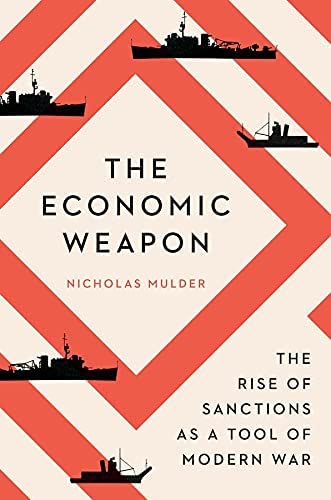Economic sanctions are a policy tool utilized frequently today as a war deterrent. How did sanctions come to become such a powerful tool? Why do sanctions sometimes not result in the consequences intended by policymakers? Does the legitimacy of sanctions hold?
In The Economic Weapon, Nicholas Mulder provides an illuminating perspective on sanctions by taking the reader back to their origin: the economic blockades used during 20th-century wartime. He dives into the history of sanctions in order to shed important light onto the array of issues generated by this dominant tool.
Today, sanctions lie in a grey area wherein there is no direct confrontation between two nations, but their presence often implies hostility as they take the shape of a weapon. Sanctions are often viewed as preventive measures to war; however, ironically, they were first utilized as a weapon in an all-out war and quite a powerful one as Mulder’s research points out. It was an instrument that enhanced the gains of victory and brought with it an evolution of administrative mechanisms that were needed to monitor trade, at a time when economic globalization was beginning its rise.
Mulder combines history with references to Norman Angell’s assumptions: due to prosperity and the possibilities offered by globalization, it makes little sense for countries to go to war. In a setting of weaponized interdependence, the WWI blockades provided a new model for economic governance where a highly connected world would mean terrifying consequences.
Mulder examines the League of Nations as the first international organization that would impose sanctions on a large, interconnected scale. He explains that as a peacekeeping organization, the League of Nations moved sanctions from the domain of war to the domain of peace, attempting to instrumentalize trade by using it either as a positive or negative weapon, that is, either as an incentive or under the threat of suspension.
The Economic Weapon puts into context the fact that sanctions came at a time when the deaths and devastation from the blockades were a memory that was alive and terrifying, and hence were a powerful deterrence tool. The author challenges the notion that the league failed to prevent war because the sanctions were weak—or that it needed military power to back the sanctions. Instead, he argues that during a time of crisis sanctions were a force that was hard to calibrate, especially with its new function as an agent of peace.
At this point, he introduces the sanctions-autarky spiral to his evaluation, the threat of sanctions triggering the need to gather resources that will render self-sufficiency. After WWI, this translated into expansionism for Germany, Japan, and Italy. He draws important points from Elizabeth Boody Schumpeter to link the interconnectedness of the relationship of sanctions, autarky, and territorial aggression with legitimacy. The objective of maintaining the status quo and defending it as legitimate involves the right of all countries to economic expansion. Consequently, tension is created when the prospect for economic growth is taken away.
Laying bare the dynamics and experiences during the two world wars, The Economic Weapon offers valuable insight into the power and consequences of sanctions—a productive and destabilizing instrument for both collective security and subtle war in our highly economically globalized and interdependent world.
Nicholas Mulder, The Economic Weapon: The Rise of Sanctions as a Tool of Modern War (Yale University Press, 2022) ISBN: 9780300270488, 448 pages
Written by Dilara Özer
Recommended





